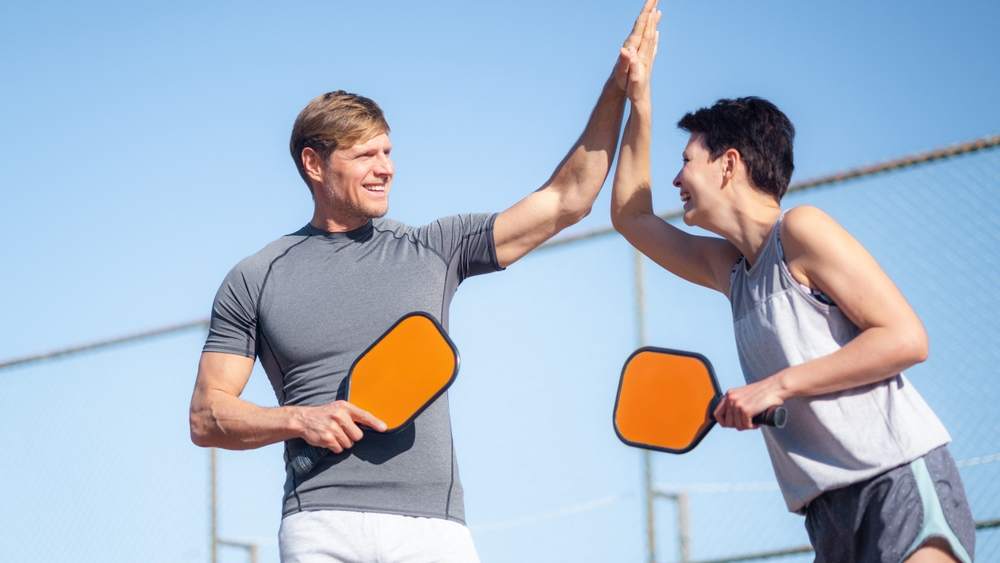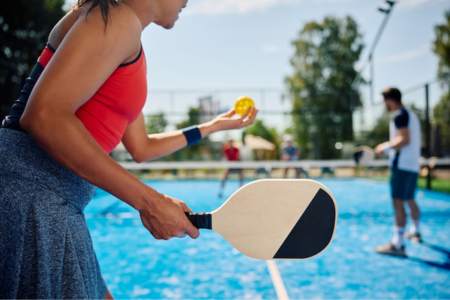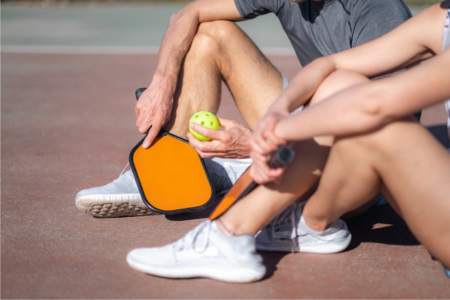
Pickleball, a sport that ingeniously blends elements of tennis, badminton, and table tennis, has rapidly gained popularity across the globe. This guide will walk you through the process of becoming a certified pickleball instructor, detailing not just how to become a pickleball instructor but also how to get certified as a pickleball instructor.
Step 1: Immerse Yourself in the Game
Beyond playing the game, it’s essential to delve into its rules, strategies, and nuances. This comprehensive understanding forms the bedrock of your teaching.
- Regular Practice: Allocate weekly practice sessions to enhance your playing skills and tactical understanding.
- Study Professional Matches: Analyze matches of top pickleball players. Note their techniques and strategies in various game scenarios.
- Join a Pickleball Club: Becoming part of a club or community offers continuous play opportunities and insights from fellow enthusiasts.
- Utilize Online Resources: Explore online tutorials, tips, and forums for additional learning.
- Read Books and Articles: Invest time in reading about pickleball to grasp the theoretical aspects, including rules, tactics, and psychology.
- Feedback from Experienced Players: Playing with and getting feedback from advanced players can help pinpoint areas for improvement.
This multifaceted approach to immersing yourself in pickleball not only sharpens your skills but also significantly enriches your ability to teach effectively, a crucial aspect in learning how to become a pickleball instructor.
Step 2: Gain Experience
Experience is a crucial teacher. When learning how to become a pickleball instructor, actively seeking and gaining experience is essential. Here are some specific steps:

- Participate in Certification Workshops: Enroll in workshops offered by renowned organizations like the Professional Pickleball Registry (PPR), Pickleball Coaching International (PCI), or the International Pickleball Teaching Professional Association (IPTPA). These workshops are held regularly in various locations and even virtually, providing comprehensive training and certification.
- Get Involved in Local Leagues and Tournaments: Engage actively in your local pickleball community by participating in leagues and tournaments. This real-world experience is invaluable for understanding game dynamics and player interactions.
- Volunteer or Assist Established Instructors: Offering your services as a volunteer or assistant to experienced instructors can provide practical teaching experience and insights into different coaching methodologies.
- Offer Free Lessons: Start by giving free lessons in your community. This not only builds your confidence as a coach but also helps in understanding diverse student needs and teaching approaches.
- Utilize Online Resources for Self-Study: Platforms like Pickleball Coaching International offer online certification programs, training videos, and resources for enhancing coaching skills. These resources are ideal for continuous learning and keeping up-to-date with the latest coaching techniques.
By following these steps, aspiring pickleball instructors can build a solid foundation of experience and expertise, which is essential for a successful coaching career.
Step 3: Pursue Certification
Pursuing certification is a crucial step in your journey to becoming a certified pickleball instructor. Start by selecting a certification body that suits your teaching style and goals, such as the Professional Pickleball Registry (PPR), Pickleball Coaching International (PCI), or the International Pickleball Teaching Professional Association (IPTPA).
Each organization has its own set of requirements for certification. For instance, PPR’s certification process includes attending a workshop, completing a written exam, and undergoing practical assessments in various areas.
Preparation is essential for the certification process. Familiarize yourself with the sport’s rules and strategies, and utilize study guides and online courses offered by these organizations. PPR, for example, suggests reading through their study guide and completing an online pre-course before attending their workshop. Additionally, certification workshops are available in different formats, including in-person and virtual sessions, catering to a range of preferences and locations.
For those who prefer online learning, Pickleball Coaching International offers a comprehensive 100% online certification program. This program allows for flexible study and assessment completion at your own pace. Some certifications, like PCI’s, also require the submission of video evaluations to demonstrate your coaching abilities.
Remember, certification is not just a one-time event. Stay informed about renewal requirements and continuing education opportunities to maintain your certification status and keep up-to-date with the latest coaching techniques. Once certified, you can enjoy numerous benefits, such as access to exclusive coaching resources, equipment discounts, and recognition in the pickleball community.
Step 4: Stay Updated and Continue Learning
In pickleball coaching, staying updated with the latest trends and continuing education is essential. Here are some specific facts and unique aspects to focus on:

- Understand and Adapt to Rule Changes: For instance, the USA Pickleball Association regularly reviews and amends the official rulebook. Recent proposed changes include modifications to the scoring process and adjustments to the non-volley zone rules.
- Embrace Current Playing Styles and Strategies: The game is now faster and more competitive. For example, the use of spin has become more prevalent, with players using topspin to control aggressive shots and backspin for defensive plays.
- Stay Informed about Equipment Advances: Be aware of the latest paddle technology and how it can affect gameplay. For instance, new paddles offer different levels of ‘pop,’ affecting the speed and spin of shots.
- Actively Participate in the Community: Engage with online forums, local clubs, and national associations. This not only helps in sharing experiences and strategies but also in staying connected with the sport’s community.
By focusing on these aspects, you can keep your coaching methods fresh, effective, and aligned with the latest developments in pickleball, ensuring that you’re well-equipped to become a pickleball instructor.
Step 5: Market Yourself
To effectively market yourself as a pickleball instructor, there are several strategies you can employ:
- Develop a Strong Online Presence: Create a professional website showcasing your services, client testimonials, and a blog or resource center offering valuable information. Actively maintain social media profiles on platforms like Facebook, Twitter, and LinkedIn to engage with your audience and share updates.
- Networking and Building Relationships: Connect with other coaches and industry experts, and attend industry events. These networking connections can lead to collaborations and referrals while helping you stay informed about industry trends and best practices.
- Referral Programs: Encourage existing clients to refer new ones by offering incentives like discounts or free sessions.
- Run Promotions: Organize promotions and special offers to generate new leads, reengage existing customers, and increase brand awareness.
Now that you’ve learned how to become a pickleball instructor, it’s crucial to focus on marketing yourself effectively. This step is essential in turning your skills and certification into a successful coaching business.
Find a Pickleball Instructor Job Today
As you conclude your journey on how to become a pickleball instructor, remember that this path offers more than just the technical knowledge of a sport; it’s about sparking passion and community in pickleball.
To further enhance your career opportunities, consider joining Jobs in Sports. A free membership provides access to various sports job listings. For more extensive resources, a paid membership offers comprehensive job listings and personalized alerts, enriching your search for the perfect role.
Explore these opportunities and find your place in the dynamic world of sports.





